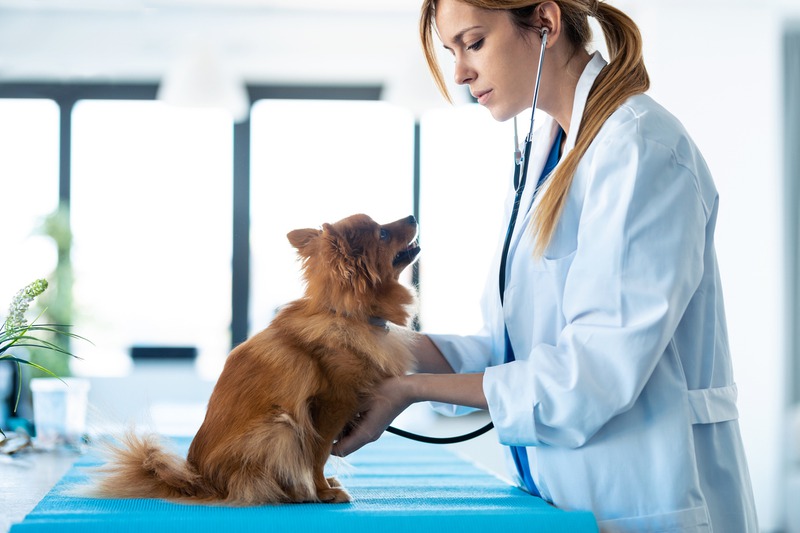
What Do Vets Check During a Routine Pet Check Up?
A routine pet check-up is essential to responsible pet ownership, ensuring pets lead healthy, happy, and long lives. Veterinarians, or vets, are the professionals trained to detect and address any medical issues pets may face, often before these issues become serious. During these routine examinations, vets perform a comprehensive assessment that covers various aspects of an animal’s health, from physical to behavioral evaluations.
During a routine pet check-up, veterinarians thoroughly examine your pet’s overall health and well-being. Here’s what they typically check:
1. Physical Examination
The veterinarian in a puppy hospital begins by conducting a comprehensive physical examination of your pet, assessing various aspects of their health, including:
-
Body Condition: Evaluate your pet’s weight, muscle tone, and overall body condition to ensure a healthy weight.
-
Coat and Skin: Checking for signs of skin irritation, infection, parasites, lumps, or growths.
-
Eyes: Examining the eyes for signs of inflammation, discharge, cloudiness, or other abnormalities.
-
Ears: Inspecting the ears for signs of infection, inflammation, or ear mites.
-
Nose: Check the nose for discharge, congestion, or other signs of respiratory problems.
-
Mouth and Teeth: Assessing the condition of your pet’s teeth, gums, and oral cavity for signs of dental disease, tartar buildup, or other issues.
-
Heart and Lungs: Listen to your pet’s heart and lungs with a stethoscope to detect abnormal sounds or rhythms.
-
Abdomen: Palpating the abdomen to check for any abnormalities or signs of discomfort.
-
Limbs and Joints: Evaluating the limbs and joints for signs of pain, swelling, or mobility issues.
2. Vaccination Status
The veterinarian reviews your pet’s vaccination history and ensures it is up-to-date on core vaccinations and any additional vaccines recommended based on its lifestyle and risk factors.
3. Parasite Control
The veterinarian discusses parasite prevention measures tailored to your pet’s needs, including flea, tick, and heartworm prevention. They may recommend specific products or treatments based on your pet’s risk of exposure.
4. Nutrition and Weight Management
The veterinarian evaluates your pet’s diet, feeding habits, and nutritional needs, offering recommendations for maintaining a healthy weight and addressing dietary concerns. They may also discuss appropriate feeding schedules and portion sizes based on your pet’s age, breed, and activity level.
5. Behavior and Mental Health
The veterinarian inquires about your pet’s behavior, temperament, and any changes in their daily routines during a dog check up. They may offer advice on behavior modification techniques, stress management strategies, and enrichment activities to support your pet’s mental and emotional well-being.
6. Laboratory Testing
Depending on your pet’s age, health status, and risk factors, the veterinarian may recommend laboratory tests such as bloodwork, urinalysis, or fecal analysis to screen for underlying health issues, monitor organ function, or detect the presence of parasites or infectious diseases.
7. Dental Examination
Dental health is an essential aspect of your pet’s overall well-being. The veterinarian examines your pet’s teeth, gums, and oral cavity for signs of dental disease, such as tartar buildup, gingivitis, or tooth decay. They may recommend professional dental cleanings or at-home dental care to maintain oral health.
8. Tailored Recommendations
Based on the findings of the physical examination and any diagnostic tests performed, the veterinarian at the veterinary clinic provides personalized recommendations for your pet’s care. This may include preventive healthcare measures, dietary adjustments, lifestyle modifications, or treatment plans for any health issues identified.
9. Lifestyle Assessment
Veterinarians also discuss your pet’s lifestyle and environment during routine check-ups. They inquire about factors such as exercise routine, outdoor activities, exposure to other animals, travel plans, and any changes in living conditions. This information helps veterinarians tailor their recommendations to your pet’s needs and circumstances, ensuring they receive appropriate care and protection.
10. Client Education and Counseling
In addition to performing physical examinations and providing medical recommendations, veterinarians use routine check-ups to educate pet owners and address any questions or concerns. They offer guidance on preventive healthcare, nutrition, grooming, behavior, and emergency preparedness. By empowering pet owners with knowledge and resources, veterinarians help them become proactive advocates for their pet’s health and well-being.
Final Thoughts
Routine pet check-ups are indispensable in maintaining the overall health, well-being, and longevity of our furry, feathered, or scaly companions. These comprehensive evaluations cover various health aspects, from physical examinations and dental checks to vaccinations and behavioral assessments. By partnering with your veterinarian and scheduling regular check-ups, you can ensure that your furry friend enjoys a happy, healthy, and fulfilling life by your side.
